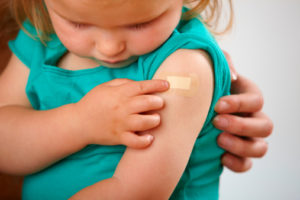
As parents, we are tasked with making the best and safest decisions for our children and their health. Unless you have been living under a rock for the past decade, you know there are very strong opinions in our culture about vaccines and their safety. This post serves to better inform you about vaccinations: what they do, why they are important, and what are any potential risk factors.
What is immunity? Immunity is when our immune system produces antibodies against a specific disease to protect us from getting sick. Active immunity can be acquired in two ways, either by contracting the disease (like chicken pox) or through vaccination. Active immunity is usually permanent, meaning an individual is protected from the disease for the duration of their lives.
What is a vaccine? A vaccine is an injection of a killed or weakened infectious organism in order to prevent the disease. Once the vaccine is injected into our body, our immune system responds to these foreign organisms by producing antibodies against them. Once those antibodies have been made, we are considered to be immune to that specific disease. Vaccines are administered through needle injections, by mouth and by aerosol.
What is the difference between a live and inactive vaccine? A live vaccine is one where a live virus is weakened (also called attenuated) through a chemical or physical process in order to produce an immune response without causing the severe effects of the disease. The current attenuated vaccines available in our country are Measles, Mumps, Rubella (MMR), shingles, varicella, and yellow fever. All other vaccines are inactive, meaning the vaccine is made up of a killed infectious organism that can still generate an adequate antibody response. The vast majority of vaccines our children receive are inactive.
Why can’t everyone receive vaccines? Some people have weakened immune systems- either genetically or from various medical conditions or treatments such as chemotherapy or immune-suppressants. These weakened immune systems are unable to generate an adequate immune response against vaccines, (especially live ones), which places them at risk for contracting the illness.
What is herd immunity? When the majority of a community is immunized against a contagious disease, most members of the community are protected against that disease because there is little opportunity for an outbreak. (http://www.vaccines.gov/basics/protection/) Newborns, pregnant women and immunocompromised individuals depend on herd immunity to stay protected from potentially deadly diseases. Some people argue that we have a duty to our community to be vaccinated to protect those that are unable to receive vaccines.
What are common vaccines that my kids should receive? Tetanus (DTap), Diptheria, Whooping Cough, Hepatitis, Hib, HPV, Influenza, Measles, Mumps, Rubella (MMR), Meningocox, Polio, Rotavirus, Varicella (Chicken pox). Click here for more information.
What side effects from vaccines should I anticipate? With any medicine, including vaccines, there is a chance of side effects. These are usually mild and resolve on their own. Most vaccine reactions are not serious: tenderness, redness, or swelling where the shot was given; or a mild fever. These happen soon after the shot is given and go away within a day or two. They happen with up to about half of vaccinations, depending on the vaccine. Serious reactions are also possible but are rare.
The safety of vaccines is always being monitored. For more information, visit CDC’s Vaccine Safety website.
Do vaccines cause autism? NO. There is no evidence from any properly conducted study that shows any association between vaccinations and autism.
One last point: I think that a lot of parents are refusing to vaccinate their children out of fear- fear of the unknown, fear of what might happen if their child has a bad reaction. But here’s the bittersweet part of parenting- we can’t predict or control everything that happens to our kids. I can reassure you that the VAST MAJORITY of children tolerate vaccines just fine, with minor to no reactions to them. And no child has ever developed autism after receiving a vaccine. What vaccines can do is predictably and effectively prevent your child (and your community) from being infected by a serious and sometimes deadly disease. And that is something we can control.
The following resources were cited:
https://www.vaccines.gov/more_info/work/index.html
https://www.cdc.gov/vaccines/hcp/vis/vis-statements/multi.html















